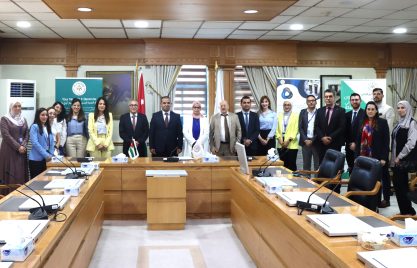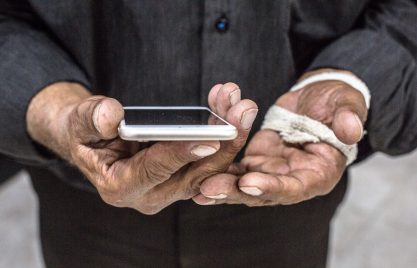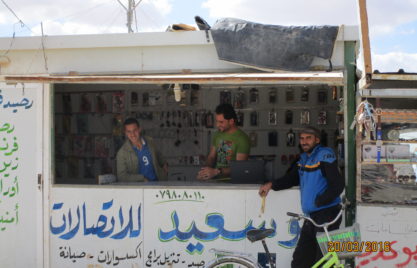The Jordan-EU-German cooperation in reforming the financial sector caters to enable more businesses and people to use better financial services to improve their economic and job perspectives. A recap of the past three years of the partnership reveals four strategic leaps forward in financial inclusion policy and microfinance.
 The Central Bank of Jordan, the Ministry of Planning and International Cooperation, the microfinance association Tanmeyah, and the Development and Employment Fund have taken wide reaching efforts to actively promote Financial Inclusion in Jordan – a project that has been carried out with the technical assistance by GIZ since 2015. The partnership focuses on the policy, regulatory and market outreach levels and a recent recap brought to light inter alia the significant progress achieved by all involved parties in the process of making the financial sector more inclusive.
The Central Bank of Jordan, the Ministry of Planning and International Cooperation, the microfinance association Tanmeyah, and the Development and Employment Fund have taken wide reaching efforts to actively promote Financial Inclusion in Jordan – a project that has been carried out with the technical assistance by GIZ since 2015. The partnership focuses on the policy, regulatory and market outreach levels and a recent recap brought to light inter alia the significant progress achieved by all involved parties in the process of making the financial sector more inclusive.
- The Central Bank of Jordan, having led financial inclusion policymaking upon the Prime Ministry’s request in 2015, on December 4, 2018 publicly launched the National Financial Inclusion Strategy under the Royal Patronage of His Majesty as well as in the presence of H.E. the Prime Minister of Jordan and 270 policymakers, regulators, and professionals from 28 nations (watch video). The 3-year strategy aims to empower businesses and particularly the youth, women, refugees, and low-income groups by means of inter alia microfinance, digital finance, SME finance, financial technology to help them unleash their development potentials. It sets the national goal of enhancing the level of financial inclusion in terms of account ownership by the adult population from 33.1% in 2017 to 41.5% by 2020.
Since 2015, the Bank has taken a strong stance in strengthening the regulatory framework conditions for microfinance, particularly focusing in on market conduct and social impact.
- The Ministry of Planning and International Cooperation, in return having been historically responsible for the political governance of microfinance, has actively steered the execution of national microfinance policies related to formalizing providers, increasing outreach of services across governorates, and local economic and social development. It is assuring the efficient transformation of responsibilities under the wider financial inclusion umbrella. Overall, the number of microfinance clients has increased to 417,000 by end-2017, up by 28% from early 2015-levels when the Central Bank widened its regulatory umbrella to cover microfinance and shortly before it kicked-off the financial inclusion strategy process.
- The Jordan microfinance network, Tanmeyah, being in charge of support services for microfinance providers, facilitating sector dialogue, and providing market intelligence, has enhanced its operations with EU support to strengthen the sector’s priority reforms of social performance, consumer protection and sector communications. Since 2015, it has been voicing the sector’s opinion on new regulations and advocating to develop markets in governorates outside of Amman. The sector has opened 11 new MFI branches outside of Amman in 2017 alone, which led to a total of 186 branches nation-wide and pushed growth in the number of clients and in the loan portfolio in governorates such as Tafielah, Madaba, Maan, Mafraq and Irbid.
- The Development and Employment Fund, representing a principle tool of the Government for executing the Financial Inclusion Strategy, over the past two years has went through an organizational transformation, developed new financial products, and equipped its staff with additional skills for reaching out to more small businesses in poverty pockets and remote areas through its 18 branches distributed across the Kingdom. It is a key player in local economic, social development among microfinance clients, more than two-thirds of which are women.
With these achievements that took Jordan to the next level in financial inclusion, the partners look back at three successful years of cooperation; and they look forward to new challenges:
- the convergence of microfinance and digital finance sectors to deliver existing and new services to customers via their mobile phones, which may primarily benefit women and young people;
- the establishment of new social performance and consumer protection practices in microfinance to empower existing and new customers, and
- the integration of transformative technology innovations into microfinance to enhance the speed of serving yet unbanked or financially underserved businesses (MSEs) and forcibly displaced persons.
The journey goes on to enable inclusive growth and employment for more people like Dirgham from Zarqa, Hiba from Ma’an, and Nisreen from Deir Alla.
https://twitter.com/euneighbours/status/968447758259642369



